In 2026, AI tools are a must-have for any lawyer who wants to keep up. Think about spending hours on legal research, going through endless case law, or drowning in documents and contracts. It’s overwhelming, right? That’s where AI comes in.
These tools are like your personal assistants, handling the tedious tasks, boosting efficiency, and freeing up your time for strategy and client interaction. Whether it’s speeding up document review or predicting how a case might go, AI tools are essential for lawyers who want to stay ahead of the curve.
Let’s be real, though. As a lawyer, I know how tough it is to manage everything alone. Research, documents, contracts, client communication, deadlines, it’s a lot. That’s when I started looking for solutions, and AI tools were the answer.
These tools are designed to help where we struggle the most: saving time, improving accuracy, and taking care of the things that used to stress us out.
Now, after using some of these AI tools, I can honestly say they’ve changed my practice for the better. Tools like Ravel Law and Casetext have made legal research faster and more accurate. And with AI-driven document review tools like Kira Systems, I’ve been able to find important information in contracts way faster.
The impact on my productivity has been huge, allowing me to focus on what matters most, serving my clients. These tools aren’t just time-savers; they’re the game-changers I didn’t know I needed.
7 Best Ai Tools for Lawyers in 2026
| AI Tools Name | Best For | Starting Pricing |
| Everlaw | Legal research, eDiscovery, case management | Contact for pricing |
| CASETEXT | Legal research, brief generation | Starting at $65/month |
| Lex Machina | Litigation analytics, case outcome prediction | Contact for pricing |
| Lawbotpro | Automating legal workflows, document generation | Starting at $99/month |
| Konproz GPT | Contract analysis, legal document generation | Contact for pricing |
| Smith.ai | Virtual receptionist, client intake | Starting at $149/month |
| Legalese Decoder | Simplifying legal jargon in documents | Contact for pricing |
1. Legal Research Automation Tools
Legal research is super important for law firms, but it can take a ton of time. Usually, lawyers spend hours manually looking through tons of legal documents, cases, and laws to find what they need. But now, AI tools are changing the game by automating legal research.
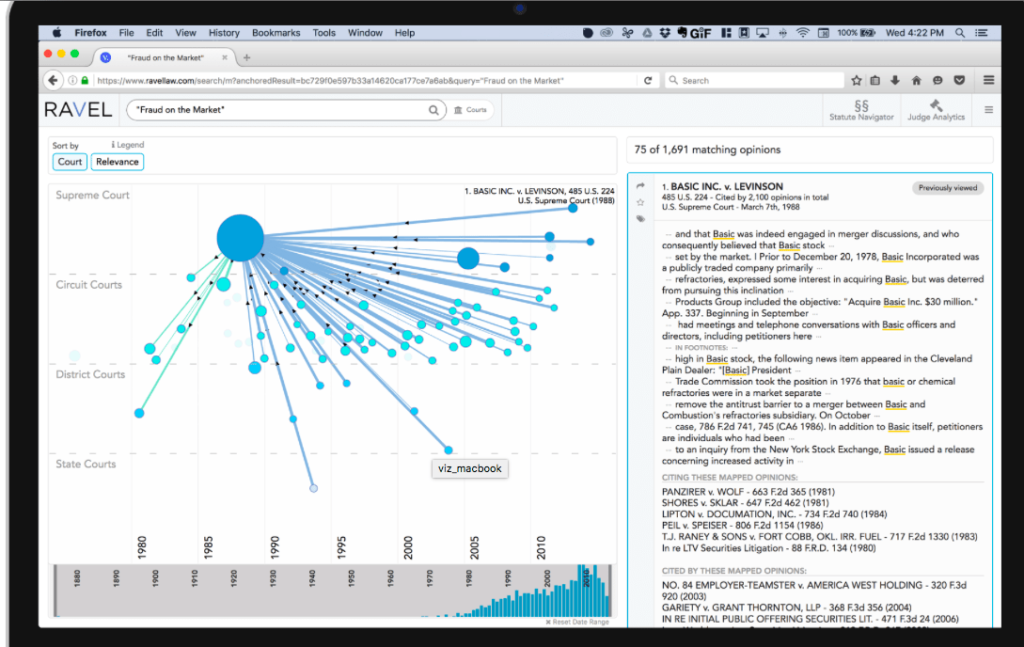
These AI-powered research tools can scan and analyze a bunch of legal data really quickly, making it way easier to find precedents, case law, and relevant laws. They use something called natural language processing (NLP) to understand the context and give more accurate search results.
By using AI for legal research, lawyers can save a lot of time, so they can focus on more important things like strategy and talking to clients. AI tools also help make sure things are accurate by getting rid of human errors in the research process.
Popular AI Tools for Legal Research in 2026
Some of the best AI tools for legal research in 2026 include:
- Ravel Law: Known for its advanced analytics and visualizations, Ravel Law uses AI to help lawyers navigate case law.
- Casetext: This AI-powered tool helps lawyers find relevant legal documents and case law in seconds, improving the speed and accuracy of legal research.
2. Document Review and Analysis Tools
Document review is another area where AI is making a significant impact. In many legal cases, lawyers must review thousands of pages of documents to identify key information. AI-powered document review tools can significantly reduce the time and effort involved in this task.

AI tools use machine learning algorithms to identify patterns and categorize documents based on relevance. They can also flag important clauses, terms, or even discrepancies within documents, saving lawyers hours of manual review.
By scanning through vast amounts of text, AI tools can pinpoint critical information, such as precedents, legal arguments, and evidence, that might otherwise be overlooked.
Top AI Tools for Contract Analysis and Review
Some of the most effective document review AI tools include:
- Kira Systems: This tool uses AI to extract key provisions from contracts and other legal documents.
- Evisort: Evisort offers AI-powered contract review and analysis, making it easier for lawyers to understand and manage contracts quickly.
3. AI-Powered Contract Drafting Tools
Drafting legal contracts is a complex and detail-oriented process, but I can make it more efficient. AI-powered contract drafting tools automate much of the repetitive work involved in creating standard contracts and legal documents.
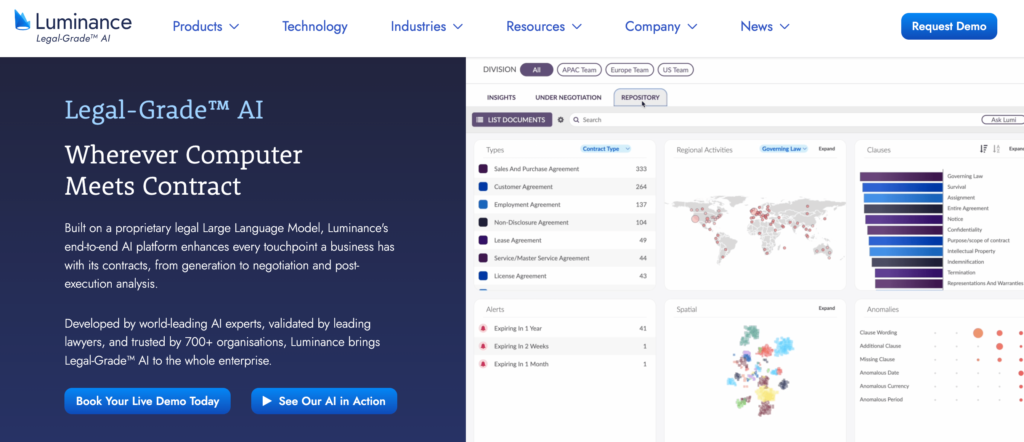
AI tools can help draft contracts by filling in templates with the necessary legal language and information. These tools can also ensure compliance with relevant laws and regulations, reducing the risk of errors.
The Best AI-Powered Contract Drafting Tools in 2026
- LawGeex: Known for its ability to automatically review and approve contracts, LawGeex uses AI to ensure compliance and reduce human error.
- Luminance: This AI-powered tool assists with drafting, reviewing, and managing contracts in real-time, providing suggestions to improve contract terms and language.
4. AI for Litigation Prediction
Litigation prediction tools powered by AI are like a crystal ball for lawyers, helping them figure out their chances of winning a case. These tools look at past court decisions, case outcomes, and legal trends to predict what might happen. It’s like having a super-smart assistant that can analyze all the data and give you an educated guess on how things might go down.
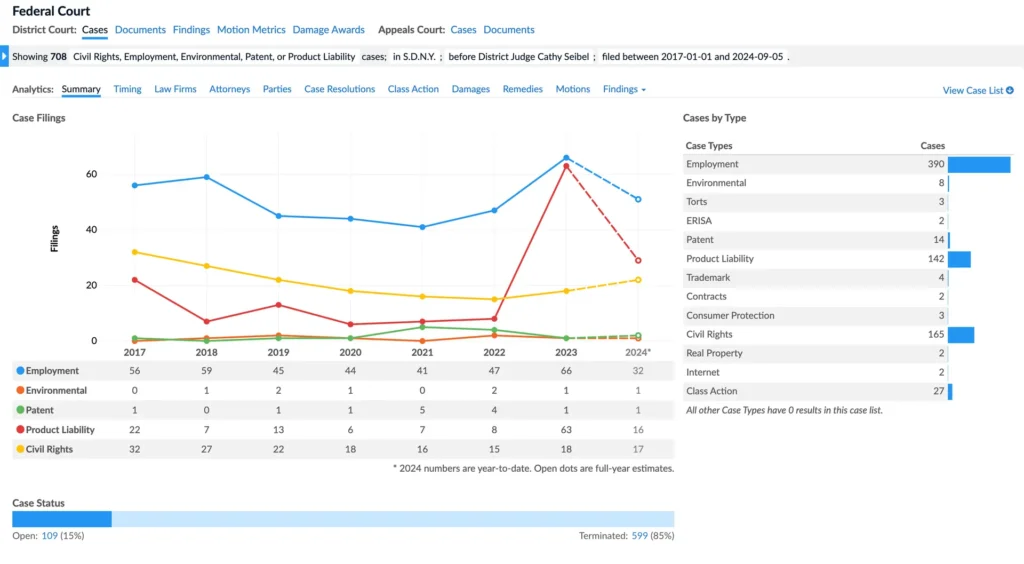
AI tools use machine learning to crunch case data, including court rulings, judge preferences, and case history, to predict the future of a case. This information helps lawyers decide whether to settle or go to trial.
Litigation prediction tools are like a secret weapon for law firms, helping them strategize and advise clients better, and potentially saving time and money. They also give attorneys data-driven guidance to assess case strength more effectively. It’s like having a superpower that helps you make better decisions.
Most Accurate AI Tools for Predicting Legal Outcomes
- Lex Machina: Lex Machina uses AI to analyze litigation data, allowing lawyers to predict the outcomes of cases and the behavior of judges.
- Premonition: This tool tracks court data and outcomes, helping law firms forecast litigation results with greater accuracy.
5. AI in Legal Billing and Time Tracking
Billing and time tracking are critical components of law firm management, and AI tools can automate and streamline these processes. AI-driven systems help lawyers accurately track billable hours and ensure that clients are billed correctly.
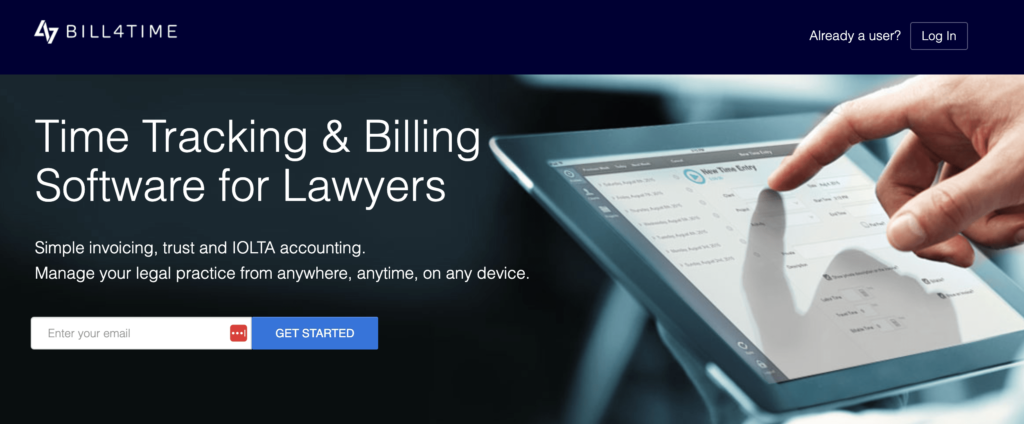
AI tools can automatically track time spent on various tasks, reducing human error and ensuring lawyers are compensated fairly for their work. This automation improves the overall efficiency of law firms by reducing administrative burdens.
Best AI Tools for Legal Billing and Time Tracking
- Clio: Clio offers AI-powered time tracking and billing solutions, integrating seamlessly with other legal practice management tools.
- Bill4Time: This tool helps lawyers track their time and manage billing with AI-driven features, ensuring more accurate invoices.
6. AI-Driven Client Management Systems
AI-driven client management systems help law firms manage client relationships more effectively. These tools can automate client communication, streamline case management, and help lawyers provide a more personalized experience.
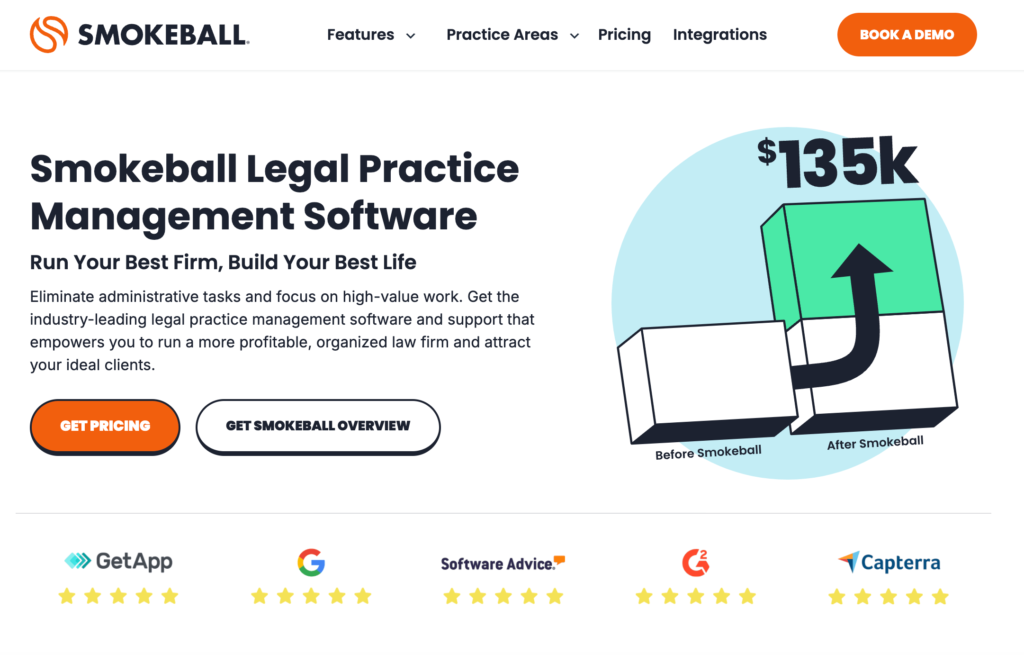
AI tools enable lawyers to communicate with clients efficiently, providing real-time updates on case status, scheduling meetings, and answering frequently asked questions through chatbots. These tools also help law firms track client preferences and needs.
By using AI to manage client data and interactions, lawyers can deliver a more personalized and responsive service. AI systems can also automate administrative tasks, allowing lawyers to focus on building relationships with clients.
Leading AI Tools for Client Management in Law Firms
- Zola Suite: A comprehensive law practice management tool that includes AI-driven client management features, including task automation and billing.
- Smokeball: Smokeball uses AI to provide real-time case updates and automate client communications, improving overall client satisfaction.
7. AI Tools for Legal Compliance and Risk Management
Compliance and risk management are crucial in the legal field, and AI tools can help ensure that law firms comply with all regulations and avoid legal pitfalls.
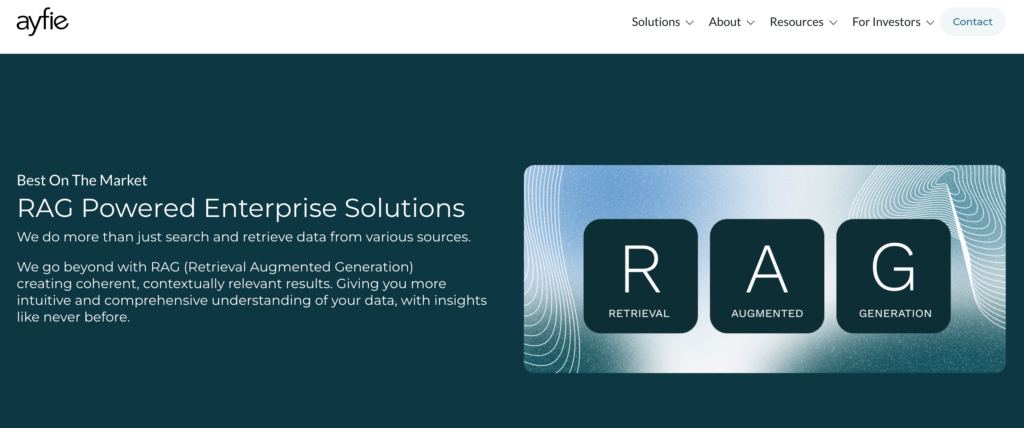
AI tools help lawyers stay up to date with changing regulations and legal requirements. By automating compliance monitoring, these tools reduce the risk of non-compliance and legal disputes.
AI tools can automatically track changes in laws and regulations, flagging any discrepancies and helping lawyers remain compliant without having to manually monitor legal updates.
Top AI Tools for Compliance and Risk Management in 2026
- Ayfie: Ayfie uses AI to automate risk analysis and compliance monitoring, making it easier for law firms to stay compliant with ever-changing regulations.
- Compliance.ai: This AI-powered platform helps legal teams track regulations and manage compliance risk effectively.
How to Choose the Right AI Tool for Your Law Practice
Selecting the appropriate AI tools for your law practice can significantly enhance efficiency and productivity. However, with a plethora of options available, making the right choice requires careful consideration of several factors:
Here’s how to pick the right AI tools for your law firm:
- Firm Size and What You Do: The size of your firm and the type of law you practice will determine which AI tools are best. Small firms doing a bit of everything might want AI that can do a lot, like automate documents and help with legal research. Bigger firms specializing in one area might need more specific AI.
- What You Need Help With: Figure out what problems you want AI to solve. Do you want to automate boring tasks, do legal research faster, or talk to clients better? Knowing what you need will help you pick the right tools.
- Working with What You Already Have: The AI tools you choose should work with the software you already use. This will make things easier for your team.
- Keeping It Simple: The AI tools should be easy to use. A complicated tool will be hard for your team to learn. Think about your team’s tech skills and choose tools that offer training and support.
- Room to Grow: As your law firm grows, your AI tools should be able to grow with you. Look for tools that have flexible pricing and can add new features.
- Staying Safe: When dealing with private client info, data security and privacy are super important. Choose AI tools that follow the rules and keep data safe.
- Good Reputation and Support: Research the company that makes the AI and see what other law firms say about them. Look for companies that offer good customer support and keep their tools up-to-date.
- Worth the Money: See if the AI tool will be worth the money. Think about how much the tool costs, how much time and money it will save you, and how much more money you might make or how much happier your clients might be.
By thinking about these things and doing your research, you can pick the best AI tools for your law firm. The right AI tools can make things easier, make work more accurate, and give your team more time to focus on the important stuff that requires human skills.
Benefits of Integrating AI Tools in Legal Workflows
AI tools are shaking things up in the legal world by making things faster, cheaper, and better for clients. By taking care of boring, repetitive tasks, AI frees up lawyers to focus on the big picture stuff like strategy, complex legal issues, and building relationships with clients. This not only boosts productivity but also helps ensure legal work is accurate and consistent.
Getting More Done, Faster
AI-powered tools can handle a bunch of tasks that used to eat up a ton of lawyer time. Things like reviewing documents, analyzing contracts, doing legal research, and due diligence can be sped up with AI algorithms that quickly find the important info, pull out key clauses, and spot potential problems. This lets lawyers focus on the specifics of each case and come up with the best legal strategies.
Saving Money and Boosting Profits
By automating routine tasks, AI tools can save law firms a lot of money. The time saved on manual work translates to lower billable hours, making legal services more affordable for clients and increasing profits for firms. AI can also help optimize resource allocation and staffing needs, leading to even more cost savings.
Happy Clients, Happy Lawyers
AI tools can enable law firms to provide faster, more responsive, and personalized client service. Chatbots and virtual assistants can handle routine inquiries, provide case updates, and schedule appointments, allowing lawyers to dedicate more time to complex client consultations and strategic advice. AI-powered analytics can also help firms anticipate client needs and tailor their services accordingly.
Fewer Mistakes, Better Results
AI algorithms can analyze tons of data with incredible accuracy and consistency, reducing the risk of human error in legal work. This is especially helpful in tasks such as document review and contract analysis, where AI can identify inconsistencies, flag potential risks, and ensure compliance with regulations.
Making Smarter Decisions with Data
AI tools can analyze large datasets to uncover patterns, trends, and insights that can inform legal strategy and decision-making. By identifying potential risks and opportunities, AI can help lawyers develop more effective legal arguments, predict case outcomes, and negotiate better settlements for their clients.
Staying Ahead of Risks and Regulations
AI can help law firms proactively manage risk and ensure compliance with regulations. By analyzing data and identifying potential red flags, AI tools can alert lawyers to potential ethical violations, conflicts of interest, and data breaches, allowing them to take corrective action and mitigate risks.
AI tools present a significant opportunity for law firms to enhance efficiency, reduce costs, elevate client service, and gain a competitive advantage in the dynamic legal landscape. As AI technology progresses, its applications within the legal industry are poised to expand, fostering further innovation and transformation in the delivery of legal services.
Conclusion
The legal world’s always changing, and AI tools are shaking things up big time. By using AI, law firms can make things run smoother, get more accurate results, keep clients happy, and stay ahead of the competition.
AI-powered tools are like a secret weapon, boosting productivity, cutting costs, supercharging legal research, making document review a breeze, and even helping with litigation strategies. As AI gets smarter, it’ll find even more ways to help out in the legal world, opening up exciting new possibilities and changing how legal services are delivered.
Law firms that jump on the AI train and make it part of how they work will be set for success. By using AI, legal professionals can focus on the important stuff that needs a human touch, making everything more efficient, leading to better decisions, and ultimately, happier clients.
FAQs
Q1. How do AI tools benefit law firms?
AI tools streamline tasks such as legal research, document review, and billing, reducing costs and improving efficiency.
Q2. Are AI tools secure for confidential legal work?
Yes, most AI tools use robust encryption and security protocols to protect sensitive legal data.
Q3. Can AI predict the outcome of any legal case?
While not 100% accurate, AI tools can provide valuable insights based on historical data to predict case outcomes with a high degree of accuracy.
Q4. Which AI tools are best for solo practitioners?
Solo practitioners may benefit from tools like Clio for billing and time tracking or Casetext for legal research.
Q5. How do AI tools integrate with existing law practice software?
Many AI tools are designed to integrate with popular practice management software, streamlining workflows and enhancing productivity.
Q6. Will AI tools replace lawyers in the future?
AI tools are meant to assist, not replace, lawyers. They automate routine tasks, allowing lawyers to focus on more complex, strategic aspects of their work.




